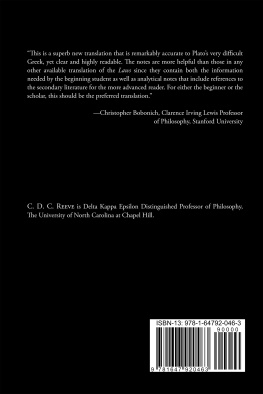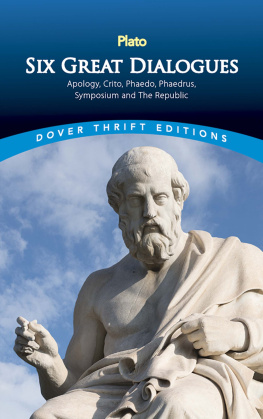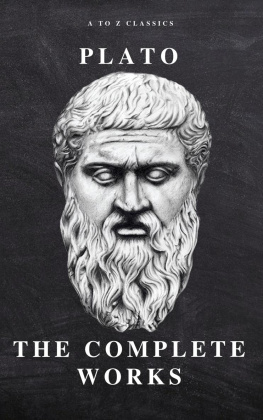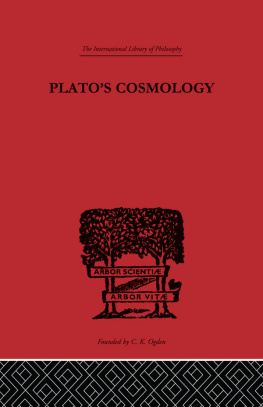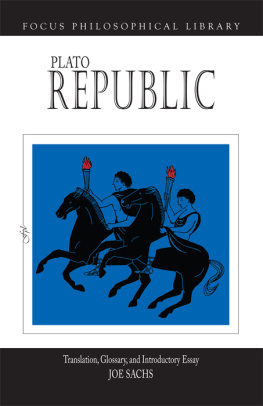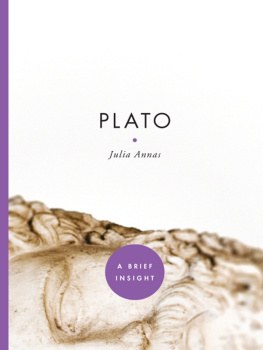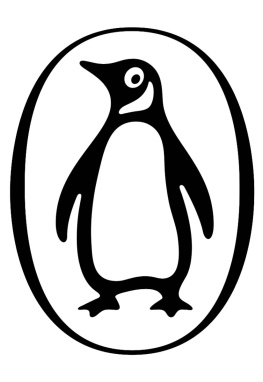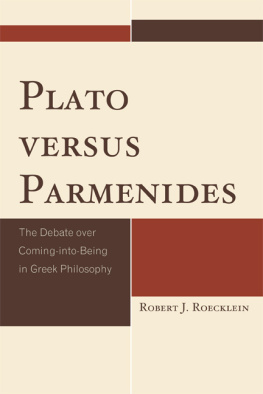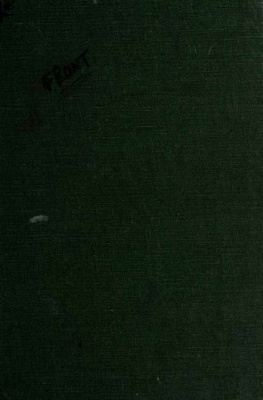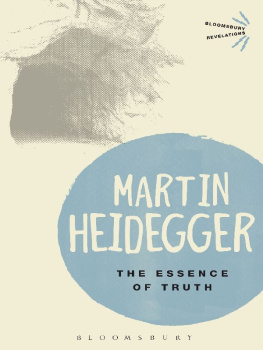Plato - Theaetetus
Here you can read online Plato - Theaetetus full text of the book (entire story) in english for free. Download pdf and epub, get meaning, cover and reviews about this ebook. genre: Science. Description of the work, (preface) as well as reviews are available. Best literature library LitArk.com created for fans of good reading and offers a wide selection of genres:
Romance novel
Science fiction
Adventure
Detective
Science
History
Home and family
Prose
Art
Politics
Computer
Non-fiction
Religion
Business
Children
Humor
Choose a favorite category and find really read worthwhile books. Enjoy immersion in the world of imagination, feel the emotions of the characters or learn something new for yourself, make an fascinating discovery.
Theaetetus: summary, description and annotation
We offer to read an annotation, description, summary or preface (depends on what the author of the book "Theaetetus" wrote himself). If you haven't found the necessary information about the book — write in the comments, we will try to find it.
Theaetetus — read online for free the complete book (whole text) full work
Below is the text of the book, divided by pages. System saving the place of the last page read, allows you to conveniently read the book "Theaetetus" online for free, without having to search again every time where you left off. Put a bookmark, and you can go to the page where you finished reading at any time.
Font size:
Interval:
Bookmark:
The Project Gutenberg EBook of Theaetetus, by Plato
This eBook is for the use of anyone anywhere at no cost and with
almost no restrictions whatsoever. You may copy it, give it away or
re-use it under the terms of the Project Gutenberg License included
with this eBook or online at www.gutenberg.org
Title: Theaetetus
Author: Plato
Release Date: November 17, 2008 [EBook #1726]
Language: English
*** START OF THIS PROJECT GUTENBERG EBOOK THEAETETUS ***
Produced by Sue Asscher, and David Widger
INTRODUCTION AND ANALYSIS. THEAETETUS |
Some dialogues of Plato are of so various a character that their relation to the other dialogues cannot be determined with any degree of certainty. The Theaetetus, like the Parmenides, has points of similarity both with his earlier and his later writings. The perfection of style, the humour, the dramatic interest, the complexity of structure, the fertility of illustration, the shifting of the points of view, are characteristic of his best period of authorship. The vain search, the negative conclusion, the figure of the midwives, the constant profession of ignorance on the part of Socrates, also bear the stamp of the early dialogues, in which the original Socrates is not yet Platonized. Had we no other indications, we should be disposed to range the Theaetetus with the Apology and the Phaedrus, and perhaps even with the Protagoras and the Laches.
But when we pass from the style to an examination of the subject, we trace a connection with the later rather than with the earlier dialogues. In the first place there is the connexion, indicated by Plato himself at the end of the dialogue, with the Sophist, to which in many respects the Theaetetus is so little akin. (1) The same persons reappear, including the younger Socrates, whose name is just mentioned in the Theaetetus; (2) the theory of rest, which Socrates has declined to consider, is resumed by the Eleatic Stranger; (3) there is a similar allusion in both dialogues to the meeting of Parmenides and Socrates (Theaet., Soph.); and (4) the inquiry into not-being in the Sophist supplements the question of false opinion which is raised in the Theaetetus. (Compare also Theaet. and Soph. for parallel turns of thought.) Secondly, the later date of the dialogue is confirmed by the absence of the doctrine of recollection and of any doctrine of ideas except that which derives them from generalization and from reflection of the mind upon itself. The general character of the Theaetetus is dialectical, and there are traces of the same Megarian influences which appear in the Parmenides, and which later writers, in their matter of fact way, have explained by the residence of Plato at Megara. Socrates disclaims the character of a professional eristic, and also, with a sort of ironical admiration, expresses his inability to attain the Megarian precision in the use of terms. Yet he too employs a similar sophistical skill in overturning every conceivable theory of knowledge.
The direct indications of a date amount to no more than this: the conversation is said to have taken place when Theaetetus was a youth, and shortly before the death of Socrates. At the time of his own death he is supposed to be a full-grown man. Allowing nine or ten years for the interval between youth and manhood, the dialogue could not have been written earlier than 390, when Plato was about thirty-nine years of age. No more definite date is indicated by the engagement in which Theaetetus is said to have fallen or to have been wounded, and which may have taken place any time during the Corinthian war, between the years 390-387. The later date which has been suggested, 369, when the Athenians and Lacedaemonians disputed the Isthmus with Epaminondas, would make the age of Theaetetus at his death forty-five or forty-six. This a little impairs the beauty of Socrates' remark, that 'he would be a great man if he lived.'
In this uncertainty about the place of the Theaetetus, it seemed better, as in the case of the Republic, Timaeus, Critias, to retain the order in which Plato himself has arranged this and the two companion dialogues. We cannot exclude the possibility which has been already noticed in reference to other works of Plato, that the Theaetetus may not have been all written continuously; or the probability that the Sophist and Politicus, which differ greatly in style, were only appended after a long interval of time. The allusion to Parmenides compared with the Sophist, would probably imply that the dialogue which is called by his name was already in existence; unless, indeed, we suppose the passage in which the allusion occurs to have been inserted afterwards. Again, the Theaetetus may be connected with the Gorgias, either dialogue from different points of view containing an analysis of the real and apparent (Schleiermacher); and both may be brought into relation with the Apology as illustrating the personal life of Socrates. The Philebus, too, may with equal reason be placed either after or before what, in the language of Thrasyllus, may be called the Second Platonic Trilogy. Both the Parmenides and the Sophist, and still more the Theaetetus, have points of affinity with the Cratylus, in which the principles of rest and motion are again contrasted, and the Sophistical or Protagorean theory of language is opposed to that which is attributed to the disciple of Heracleitus, not to speak of lesser resemblances in thought and language. The Parmenides, again, has been thought by some to hold an intermediate position between the Theaetetus and the Sophist; upon this view, the Sophist may be regarded as the answer to the problems about One and Being which have been raised in the Parmenides. Any of these arrangements may suggest new views to the student of Plato; none of them can lay claim to an exclusive probability in its favour.
The Theaetetus is one of the narrated dialogues of Plato, and is the only one which is supposed to have been written down. In a short introductory scene, Euclides and Terpsion are described as meeting before the door of Euclides' house in Megara. This may have been a spot familiar to Plato (for Megara was within a walk of Athens), but no importance can be attached to the accidental introduction of the founder of the Megarian philosophy. The real intention of the preface is to create an interest about the person of Theaetetus, who has just been carried up from the army at Corinth in a dying state. The expectation of his death recalls the promise of his youth, and especially the famous conversation which Socrates had with him when he was quite young, a few days before his own trial and death, as we are once more reminded at the end of the dialogue. Yet we may observe that Plato has himself forgotten this, when he represents Euclides as from time to time coming to Athens and correcting the copy from Socrates' own mouth. The narrative, having introduced Theaetetus, and having guaranteed the authenticity of the dialogue (compare Symposium, Phaedo, Parmenides), is then dropped. No further use is made of the device. As Plato himself remarks, who in this as in some other minute points is imitated by Cicero (De Amicitia), the interlocutory words are omitted.
Theaetetus, the hero of the battle of Corinth and of the dialogue, is a disciple of Theodorus, the great geometrician, whose science is thus indicated to be the propaedeutic to philosophy. An interest has been already excited about him by his approaching death, and now he is introduced to us anew by the praises of his master Theodorus. He is a youthful Socrates, and exhibits the same contrast of the fair soul and the ungainly face and frame, the Silenus mask and the god within, which are described in the Symposium. The picture which Theodorus gives of his courage and patience and intelligence and modesty is verified in the course of the dialogue. His courage is shown by his behaviour in the battle, and his other qualities shine forth as the argument proceeds. Socrates takes an evident delight in 'the wise Theaetetus,' who has more in him than 'many bearded men'; he is quite inspired by his answers. At first the youth is lost in wonder, and is almost too modest to speak, but, encouraged by Socrates, he rises to the occasion, and grows full of interest and enthusiasm about the great question. Like a youth, he has not finally made up his mind, and is very ready to follow the lead of Socrates, and to enter into each successive phase of the discussion which turns up. His great dialectical talent is shown in his power of drawing distinctions, and of foreseeing the consequences of his own answers. The enquiry about the nature of knowledge is not new to him; long ago he has felt the 'pang of philosophy,' and has experienced the youthful intoxication which is depicted in the Philebus. But he has hitherto been unable to make the transition from mathematics to metaphysics. He can form a general conception of square and oblong numbers, but he is unable to attain a similar expression of knowledge in the abstract. Yet at length he begins to recognize that there are universal conceptions of being, likeness, sameness, number, which the mind contemplates in herself, and with the help of Socrates is conducted from a theory of sense to a theory of ideas.
Font size:
Interval:
Bookmark:
Similar books «Theaetetus»
Look at similar books to Theaetetus. We have selected literature similar in name and meaning in the hope of providing readers with more options to find new, interesting, not yet read works.
Discussion, reviews of the book Theaetetus and just readers' own opinions. Leave your comments, write what you think about the work, its meaning or the main characters. Specify what exactly you liked and what you didn't like, and why you think so.


